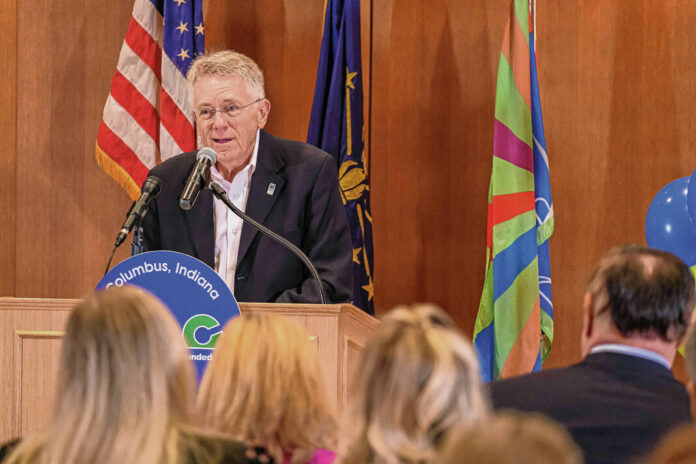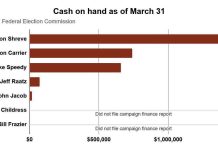
Mike Wolanin | The Republic Columbus Mayor Jim Lienhoop thanks community partners during a ceremony where Columbus, Indiana was named the Indiana Chamber of Commerce Community of the Year in the Cal Brand Meeting Room at Columbus City Hall, Monday, Aug. 29, 2022.
City officials are preparing for what they describe as a “pretty busy” year in 2023, outlining a range of priorities for the year ahead that include making significant progress on NexusPark, “downtown activation,” among other plans.
Columbus Mayor Jim Lienhoop, who is entering his final year as mayor, said he anticipates “being pretty busy.” “I think we will have a lot to do,” he said. “I’m looking forward to it.”
NexusPark
City officials say that expect to make significant progress on NexusPark in 2023, including “substantial completion” of an indoor sports fieldhouse and parks department office space.
NexusPark is a joint effort between the city of Columbus and Columbus Regional Health to transform the former FairOaks Mall into a health, wellness and recreation center.
The 150,000-square-foot fieldhouse will be “a sports and events venue that will host a multitude of different types of sporting and non-sporting events,” including local, regional and state sports tournaments, as well as potentially hosting trade shows, conferences, graduation and large-scale community events, according to the project’s website.
Construction crews earlier this month started pouring concrete for what will become the footing of the fieldhouse. Officials expect steel for the fieldhouse structure to arrive in February, with putting up the steel structure tentatively expected sometime in March, said Mary Ferdon, the city’s director of administration and community development.
At the same time, a demolition ceremony has been scheduled for early February for the part of the former mall property that will house parks department’s new offices, Lienhoop said.
“It’s a big project, and it’s a lot to manage,” Lienhoop said. “…We will continue to just monitor that project and try to get it along so that we can begin to have some events there in the first quarter of 2024.”
“That will keep us busy all year long,” Lienhoop added.
Downtown activation
Lienhoop said he also expects the city to continue taking action to boost what he described as “downtown activation” to counteract the impact that the COVID-19 pandemic has had on foot traffic in the city’ downtown area.
Officials said they are excited about the potential of a new downtown apartment complex and urban grocer that is expected to open at some point in 2023.
The complex, called The Taylor, will be located 725 Second St. not far from the Bartholomew County Jail, is expected to add an additional 300 residents to the downtown area, Lienhoop said.
“We’re excited about the economic activity (the new residents) will bring to our downtown,” Lienhoop said. “The pandemic has taken a toll on a variety of areas in our lives. An in terms of the activity that has occurred in the past in the downtown area, it has had an effect on that. We see that most starkly with respect to the retail and restaurant activity in our downtown. We think that one of the solutions to that is to just bring more people downtown, and the housing project will help with that.”
“Downtowns continue to be important for communities,” he added.
‘Second-class city’ status
Additionally, city officials expect to spend time preparing or the Columbus’ planned transition from a “third-class city” to a “second-class city,” which is expected to take effect Jan. 1, 2024.
This past summer, the Columbus City Council passed an ordinance that will officially make Columbus a “second-class city” on Jan. 1, 2024. The change entails certain changes to the city structure, including the addition of two more city council members.
The change in city status also affects other positions. State code specifies that while third-class cities elect a clerk-treasurer, second-class cities elect a clerk. Both positions fill the role of city clerk. However, the clerk-treasurer also serves as the city’s fiscal officer. In a second-class city, the fiscal officer is a city controller appointed by the mayor.
“The biggest impact that we’ll have in 2023 is preparation for that (transition), which specifically will be the hiring of a controller,” Lienhoop said. “We anticipate doing that sometime in the late third or fourth quarter of 2023 so that we’re ready to go (on Jan. 1, 2024.) There may be some minor reconfiguring of office space inside city hall, but we will probably be looking at that sometime in the summer.”
Transit study
The city plans to conduct a transit study in 2023 to respond to what officials said is a need for workforce and senior transportation.
“Like every other community, we just see an evolution of the needs that we have for our transportation, and where we clearly see a need is workforce and senior transportation,” Ferdon said. “In 2023, we’re going to do a transit study and benchmark what other communities are doing and seeing if we can get more efficiencies.”
Part of the study will explore the possibility of eliminating the use of some of the city buses and transition to smaller vans and “maybe do some point-to-point services,” Ferdon said.
One challenge that the city is facing is how to transport workers efficiently to Walesboro, particularly the Woodside area, Lienhoop said.
“Not every factory starts at the same time,” Lienhoops said. “They don’t all run the same hours, and that’s a good thing from a traffic control perspective, because you don’t want everybody showing up or leaving at the same time. But it presents a challenge for public transportation because the buses run fixed routes on fixed times, and if those times don’t work for a particular employer, then we’ve not met their need. Part of what we want to gain from this study is a way to find a system that’s a little more flexible, hopefully more efficient, in terms of getting people where they need to be, when they need to be there.”
Renewable energy
City officials also said they anticipate spending time this year looking at the potential for integrating solar energy in the community, including at city facilities and potentially the NexusPark site.
Lienhoop said that a provision in the federal Inflation Reduction Act provides some economic incentives for municipalities that pursue a solar field or solar farm. The incentives include direct payments from the federal government to help defray the costs of solar installations.
City officials have been meeting with officials in Bloomington to see how to address some environmental issues, including solar energy, Lienhoop said.
“We’ve already had some discussions with our folks at utilities, and the accounting firm that the city usually relies upon to try to find a way to make something like that a reality,” Lienhoop said.
However, the city is not “anywhere close” to having any firm plans for solar installations,” Lienhoop said.
“But we are going to spend some time actually taking a look at a way to try to bring that to our community,” Lienhoop said. “There are some significant challenges in terms of just where are you site it, as witnessed by the recent deliberations by the county planning department. So, we have to be mindful of all that. At the same time, there are some real-life economic questions that have to be answered.”




